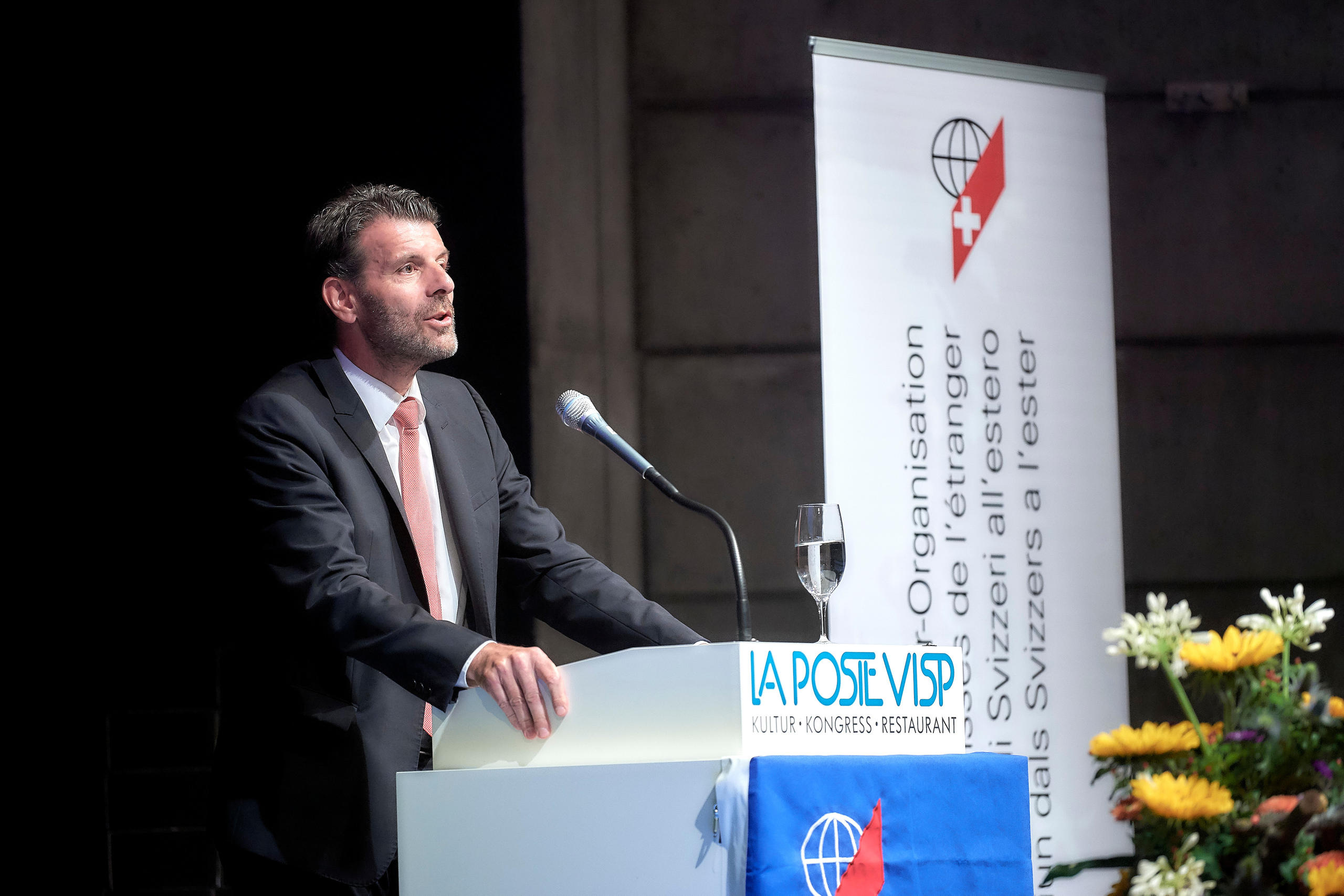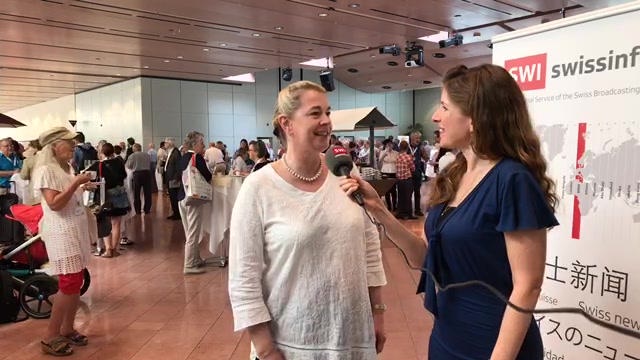
Mixed messages about future Swiss-EU relations

Switzerland’s relations with the European Union have been at the centre of the annual Congress of the Swiss Abroad. Two keynote speeches gave some indications of the delicate situation for both sides in crucial talks about the future of the bilateral accords.
Some members of the audience might have come away from Saturday’s speeches, presentations and panel discussions with a certain feeling of disappointment.
Hoping to get some insight into ongoing negotiations between Switzerland and Brussels, they were certainly told of the importance of stable relations both for the economy and citizens in Switzerland and the 28-nation bloc.
But neither Roberto BalzarettiExternal link, head of the directorate for European affairs in the Swiss foreign ministry, nor Michael MatthiessenExternal link, the EU ambassador to Switzerland, were willing to reveal any details of the tricky negotiations.
Brussels has been pushing for Switzerland to agree a framework accord to consolidate a system of bilateral accords, but political opposition in Switzerland to the deal has been growing.
The Swiss trade unions earlier this week refused to sit down with the government, which was hoping to find common ground for negotiations on a labour agreement with Brussels, one of the last sticking points for a framework accord.
The unions have warned that the government is about to weaken safeguards protecting Swiss businesses and workers against EU companies trying to undercut Swiss salary levels.
“The aim of the government is to strengthen relations with the EU in the long term and to ensure economic prosperity while maintaining the highest possible degree of sovereignty for Switzerland,” said Balzaretti.
For his part, Matthiessen said the time was right to consolidate relations with a framework accord. “Switzerland and Europe need each other more than ever,” he said. “If the EU economy is doing well, the Swiss also feel a beneficial impact.”
+ Matthiessen about his role as EU ambassador to Switzerland
Both diplomats stressed the many similarities between non-EU Switzerland and the 28-nation bloc, dismissing allegations that moves were afoot to undermine labour regulations for Swiss workers by easing restrictions for EU companies.

Guarded optimism
Balzaretti appeared to be cautiously optimistic that a compromise could be found both among the various political parties and institutions in Switzerland and with the EU, despite the current row.
“Discussions have to continue to find a way out,” he said, referring to the Swiss policy of compromise. Once there is common understanding on the goals, Switzerland can sit at the negotiating table with the EU.
“Let’s work towards a consensual solution with self-confidence and modesty,” Balzaretti said.
The government is due to decide in the next few weeks whether to seek a successful conclusion of the negotiations or whether no acceptable deal can be struck. Balzaretti did not exclude the latter option but warned that it was an illusion to believe that Switzerland could go it alone.
Insistence and impatience
In his speech, Matthiessen reiterated that the reform of the Swiss eight-day notice rule is fundamental for the EU.
He said Brussels didn’t want to undermine workers’ salary levels in Switzerland, but it could not tolerate any discrimination of EU companies.
He added that a window of opportunity to solve outstanding issues would close before the end of the year, as elections are due both in Switzerland and the EU next year. In addition, Brussels is likely to prioritise Britain’s planned exit from the EU on March 29.
“Switzerland has been a privileged partner of the EU, getting access to the common market despite rejecting the European Economic Area treaty,” he said.
In the wake of the 1992 vote, Brussels and Switzerland agreed two series of agreements on trade, transport, labour, security and asylum, creating an unwieldy system of more than 120 separate bilateral treaties over the decades.
Matthiessen said he believed that the EU would no longer offer such tailor-made solutions to Switzerland if it could go back in time. Indirectly he appeared to indicate that Brussels is gradually losing its patience and that Switzerland can’t count on a special treatment if it is not willing to compromise.

More
Which issues are important to the Swiss abroad?
Swiss expats in Europe
About 62% of the expatriate Swiss community live in Europe, according to official statistics, notably in neighbouring France, Germany, Italy and Austria. In total there are currently 750,000 Swiss living around the world.
Some 1.4 million EU citizens live in Switzerland and Swiss companies rely on the 320,000 cross-border workers from EU countries.
53% of Swiss exports go to the EU market, while Swiss imports from the EU make up 71%.
The theme of this year’s Congress of the Organisation of the Swiss Abroad (OSA) was: Switzerland without Europe – Europe without Switzerland.
“Relations between Switzerland and Europe are much more than just a European issue. There is a global dimension not only for the consequences for Switzerland but also for the economic as well as for domestic and foreign policy,” said OSA directors Ariane Rustichelli and Sarah Mastantuoni.
Ahead of the two-day congress, delegates of the Council of the Swiss Abroad met for a regular session.
+ Read details of Friday’s discussions in the expat assembly in Visp

In compliance with the JTI standards
More: SWI swissinfo.ch certified by the Journalism Trust Initiative






























You can find an overview of ongoing debates with our journalists here . Please join us!
If you want to start a conversation about a topic raised in this article or want to report factual errors, email us at english@swissinfo.ch.